|
|
|
Sort Order |
|
|
|
Items / Page
|
|
|
|
|
|
|
| Srl | Item |
| 1 |
ID:
114513
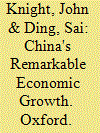

|
|
|
|
|
| Publication |
Oxford, Oxford University Press, 2012.
|
| Description |
xvii, 336p.Hbk
|
| Standard Number |
9780199698691
|
|
|
|
|
|
|
|
|
|
|
|
Copies: C:1/I:0,R:0,Q:0
Circulation
| Accession# | Call# | Current Location | Status | Policy | Location |
| 056778 | 338.951/KNI 056778 | Main | On Shelf | General | |
|
|
|
|
| 2 |
ID:
163502
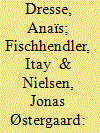

|
|
|
|
|
| Summary/Abstract |
Environmental peacebuilding represents a paradigm shift from a nexus of environmental scarcity to one of environmental peace. It rests on the assumption that the biophysical environment’s inherent characteristics can act as incentives for cooperation and peace, rather than violence and competition. Based on this, environmental peacebuilding presents cooperation as a win-win solution and escape from the zero-sum logic of conflict. However, there is a lack of coherent environmental peacebuilding framework and evidence corroborating the existence of this environment-peace nexus. Building on a multidisciplinary literature review, this article examines the evolution of environmental peacebuilding into an emerging framework. It unpacks the concept and explains its main building blocks (conditions, mechanisms and outcomes) to develop our understanding of when, how and why environmental cooperation can serve as a peacebuilding tool. It assembles these building blocks into three generic trajectories (technical, restorative and sustainable environmental peacebuilding), each characterised according to their own causality, drivers and prerequisites, and illustrated with concrete examples. Finally, this article draws attention to the remaining theoretical gaps in the environmental peacebuilding literature, and lays the foundations for an environmental peacebuilding research agenda that clarifies if and how environmental cooperation can spill over across borders, sectors and scales towards sustainable peace.
|
|
|
|
|
|
|
|
|
|
|
|
|
|
|
|
| 3 |
ID:
177070


|
|
|
|
|
| Summary/Abstract |
Most explanations for the crisis of the liberal order revolve around geopolitics, globalization, economic resentment fueling new forms of populism and nationalism, and Western states following their interests away from liberal values and institutions of their creation. But international orders are produced and legitimated by both material and spiritual forces. The spirit in liberalism is moral progress defined by practices of humanity. If the Liberal International Order (LIO) is in decline, then perhaps we should consider its moral foundations. Section “Introduction” briefly introduces the question of international order, categorizes international relations theories according to the mixture of consent and coercion, and how legitimacy often refers not only to the existing order but a vision of progress. This is particularly true of the liberal international order. Section “International Order, Legitimacy, and Progress” turns to the liberal international order, progress, and the possible spiritual decline of the liberal international order. After briefly considering the liberal in international liberalism and the late 20th-century emergence of the liberal international order, I argue that one reason for its declining moral foundations is because of the pronounced individualism that resides at the heart of the contemporary international order. In other words, the sources of decline are not exogenous but rather part of liberalism. The Conclusion asks: what is next? The conjunction of the decline of the LIO and COVID-19 has complicated the debate about the future international order, and much of the conversation hinges on whether and how the United States can recover from its self-destructive tendencies and China’s intentions. But where is the spirit of moral progress and humanity in this discussion?
|
|
|
|
|
|
|
|
|
|
|
|
|
|
|
|
| 4 |
ID:
132688
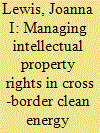

|
|
|
|
|
| Publication |
2014.
|
| Summary/Abstract |
This paper examines how the United States and China are implementing the most ambitious model of bilateral clean energy technology cooperation to date: The U.S.-China Clean Energy Research Center (CERC). It finds that the CERC has been able to generate new IP through RD&D activities, though minimal IP has come from collaborative activities involving both U.S. and Chinese participants. Many participants reported that the CERC's Technology Management Plan (TMP) mitigated their IP concerns, though few have tested its efficacy or enforceability. While it is too early to comprehensively assess the efforts of the CERC, it is increasingly evident that the CERC provides a model for collaborative clean energy RD&D that is unique in the history of U.S.-China collaborations in this area. The TMP may ultimately play an important role in building trust among the consortia participants, which could lead to even more constructive collaborations in the future, and serve as a model for future bilateral cooperation agreements. Without sustained support, and continued attention to IP concerns, it will be even harder for China and the United States to make progress towards true cross-national research collaborations which ultimately could produce considerable global benefits, particularly in the clean energy field.
|
|
|
|
|
|
|
|
|
|
|
|
|
|
|
|
| 5 |
ID:
110315
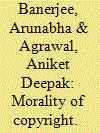

|
|
|
|
|
| Publication |
2011.
|
| Summary/Abstract |
This article seeks to examine debatable issues that have arisen following the controversy involving author's rights after the release of the film '3 Idiots' based on Chetan Bhagats's novel '5 Point Someone'. The fact that Bhagat failed to get due recognition in the credits of movie along with alleged mutilation of the original work raises the question of recognition of moral rights in India. Following the 1994 amendment, copyright law has drifted away from the objective of viewing a work as an integral expression of the author's personality - probably reason why contracts continue to dictate the rights and obligations of parties in such transactions. This article throws light on the need to restore focus on these legitimate concerns by undertaking a critical comparison of the position under foreign laws. The difference in the perspectives of common law and civil law countries in treating the issue of morality of copyright has been marked. A number of illustrative case laws and international conventions have been discussed under various jurisdictions to cull out the basic tenets of moral nature of copyright. The article also puts forth certain suggestions to address the legal concerns.
|
|
|
|
|
|
|
|
|
|
|
|
|
|
|
|
| 6 |
ID:
114269
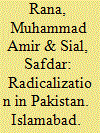

|
|
|
|
|
| Publication |
Islamabad, Pakistan Institute for Peace Studies, 2012.
|
| Description |
173p.Hbk
|
|
|
|
|
|
|
|
|
|
|
|
Copies: C:1/I:0,R:0,Q:0
Circulation
| Accession# | Call# | Current Location | Status | Policy | Location |
| 056680 | 320.53095491/RAN 056680 | Main | On Shelf | General | |
|
|
|
|
| 7 |
ID:
126689
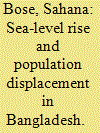

|
|
|
|
|
| Publication |
2013.
|
| Summary/Abstract |
Bangladesh is one of the most vulnerable countries in the world due to climate change and sea level rise (SLR). This has caused large-scale population displacement, human insecurity and illegal migration to India. This paper first analyses the environmental crisis of Bangladesh taking into considerations the problem of SLR, tropical cyclones, soil salinity and mangrove depletion. The second part of the paper discusses its impact on India with special emphasis on the problem of illegal Bangladeshi migration on three areas - North Bengal, Indian Sunderbans Region and North East India. It discusses the possibilities of retaining back the climate-induced migrants through climate change adaptation techniques, people's participation and the bilateral cooperation between India and Bangladesh
|
|
|
|
|
|
|
|
|
|
|
|
|
|
|
|
|
|
|
|
|